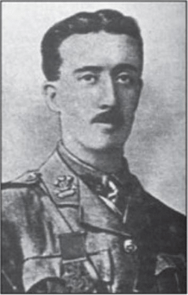John Vincent Holland facts for kids
Quick facts for kids
John Vincent Holland
|
|
|---|---|
 |
|
| Born | 19 July 1889 Athy, County Kildare, Ireland |
| Died | 27 February 1975 (aged 86) Hobart, Tasmania, Australia |
| Allegiance | United Kingdom/British Empire |
| Service/ |
British Indian Army |
| Rank | Major |
| Unit | 3rd Battalion, Prince of Wales's Leinster Regiment |
| Battles/wars | World War I World War II |
| Awards | Victoria Cross |
John Vincent Holland (born July 19, 1889 – died February 27, 1975) was a brave Irish soldier. He fought in World War I and received the Victoria Cross (VC). This award is the highest honor for courage given to soldiers from Britain and Commonwealth countries.
Contents
Early Life and School
John Vincent Holland was born in Athy, County Kildare, Ireland. His father was a veterinary surgeon, which means an animal doctor. John went to school at Clongowes Wood College. Later, he studied at Liverpool University. He was one of about 600 students from his old school who joined the army during World War I.
Serving in World War I
When World War I started, John joined the 2nd Life Guards in November 1914. He trained at Cumbermere Barracks in Windsor. After a short time, he became an officer in the 3rd Battalion of the Leinster Regiment.
In March 1915, he joined the 2nd Battalion of the Royal Dublin Fusiliers. He was wounded in August and had to go back to England and Ireland to get better. But he soon returned to France. He then served with the 7th Battalion Leinster Regiment. There, he was in charge of the battalion's bombing team.
His Victoria Cross Action
On September 3, 1916, a major battle called the Battle of the Somme was happening. Lieutenant Holland was fighting near a village called Guillemont. He showed incredible bravery and was awarded the Victoria Cross for his actions.
Here is what happened:
- During a very tough fight, Lieutenant Holland did not just throw bombs into enemy dugouts.
- He bravely led his soldiers through their own artillery fire.
- He helped clear a large part of the village from the enemy.
- He started with 26 soldiers but finished with only five.
- Even with fewer men, he captured about 50 enemy prisoners.
- His brave actions really broke the enemy's spirit. They also saved many lives on his side.
After this amazing act of courage, John Holland was promoted to Captain. He was also mentioned in official reports for his bravery. His commanding general, Major-General William Hickie, gave him a special award called a "Hickie Parchment." This was to recognize his bravery in battle.
Life After the War
In 1917, John Holland married Frances Grogan in Cork City. They had two sons together. Their son, Major Niall V. Holland, sadly died in Burma during World War II in 1944. Their other son was Norman J. Holland.
After World War I, John joined the Indian Army as a Lieutenant in 1919. He was confirmed as a Captain in 1920. He retired from the army in September 1922.
When World War II began, John Holland joined the army again. He served as an administrative officer for the 79th Heavy Anti-Aircraft Regiment. Then, he rejoined the Indian Army. However, he had to leave in 1941 due to illness. After that, he worked for the Ministry of Food.
In 1956, John and his wife moved to Hobart, in Tasmania, Australia.
His Final Years
John Holland passed away in Hobart in February 1975. He was 86 years old. He was buried with military honors at Cornelian Bay Cemetery. His wife, Frances, had passed away earlier in 1960. John lived long enough to see the birth of his great-grandchild.
Remembering a Hero
On September 3, 2009, a special memorial plaque was put up at Guillemont Church in France. This plaque honors three soldiers who won the Victoria Cross during the fighting at Guillemont in 1916. John Holland's name is one of the three heroes remembered there.
 | Calvin Brent |
 | Walter T. Bailey |
 | Martha Cassell Thompson |
 | Alberta Jeannette Cassell |

